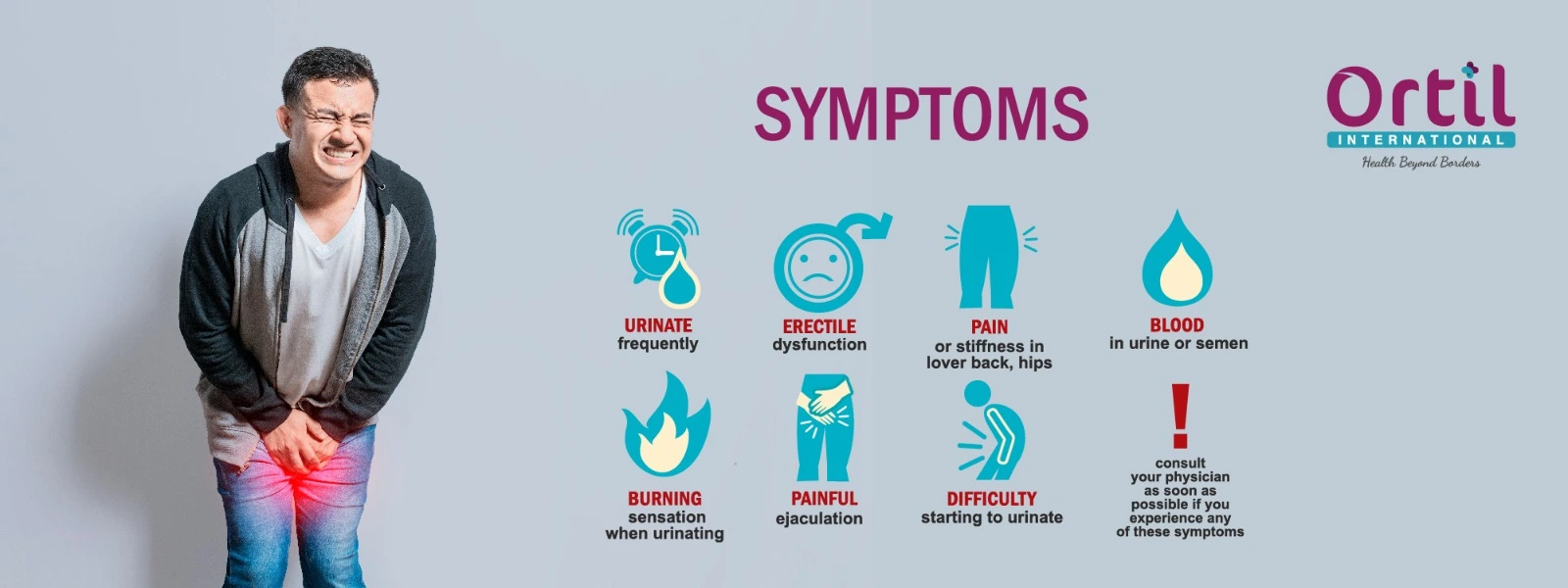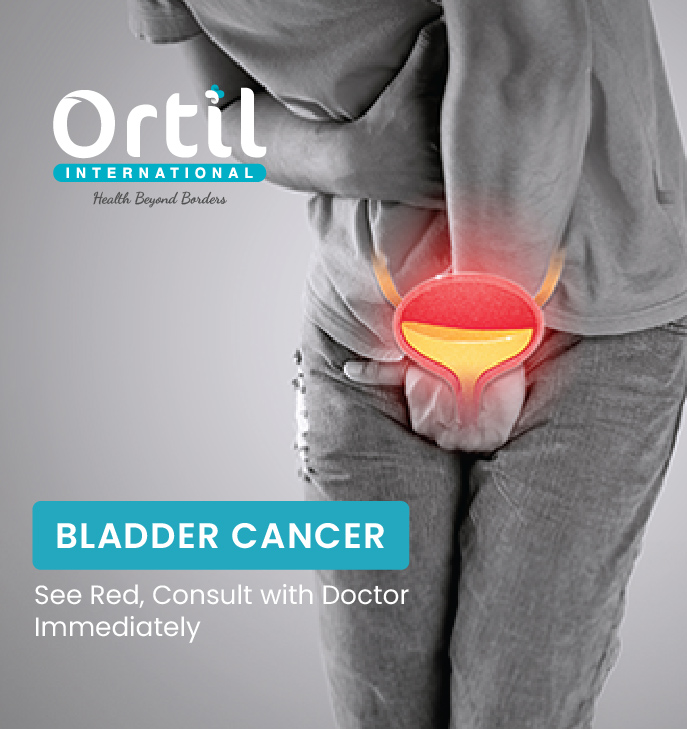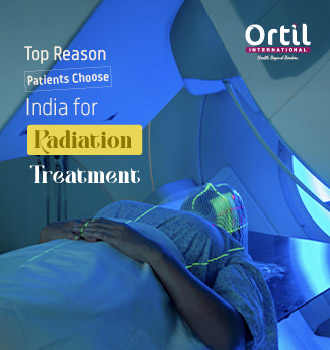What are the best treatment options for prostate cancer?

Prostate cancer is the abnormal cell division in the prostate gland. Prostate gland is only present in men, located just below the urinary bladder. The abnormal cells can spread from the prostate gland to other organs of the body.
Prostate cancer is the most common type of cancer in men. In some cases, prostate cancer develops without any abnormal signs and symptoms and patients may live a normal life without any treatment because prostate cancer does not grow rapidly. But sometimes, it may grow very fast and aggressively.
It's important for men to discuss the screening for prostate cancer. Regular checkups can be helpful in detecting prostate cancer in the early stages which makes it easier to treat.
What are the Signs and Symptoms for Prostate Cancer?
Signs and symptoms of prostate cancer are not the same in each individual with prostate cancer. It may be asymptomatic in the early stages. Some signs and symptoms of prostate cancer in the later stages are:
- Difficulty in urination
- Decrease stream of urine
- Blood pass in the urine
- Blood present in semen
- Pain in bones
- Weight loss without any reason
- Erectile dysfunction
The above mentioned symptoms can also be due to some other reason. For example, when the prostate gland develops the non-cancerous growth of cells, it may also cause these symptoms. But it is still very important to discuss these symptoms with your physician.
What are the Treatment Options for Prostate Cancer?
If you have prostate cancer, your physician and oncologist will give you the treatment options for prostate cancer. They also tell you the pros and cons of each treatment and then you will decide the best treatment option for prostate cancer. Some of the best treatment options for prostate cancer are described below:
PROSTATE CANCER RADIATION THERAPY
In radiation therapy, the high energy x-rays are used to kill the cancerous cell in the prostate gland. The radiation therapy for prostate cancer can be used alone or in combination with other treatment options. The types of radiation therapy are:
External Beam Radiation Therapy
In the external radiation therapy, the x-rays come from the source outside the body which is a machine that directs the beam of x-rays to the tumor through the skin. You will need usually 4-5 sessions of radiation therapy each week for a month or two.
Internal Beam Radiation Therapy or Brachytherapy
Brachytherapy is the treatment where the radioactive material is placed inside your prostate. This material will kill the cancer cells by emitting radiation. It is the best treatment for prostate cancer in early stage or can be the option for advance stage in combination with external beam therapy.
PROSTATE CANCER SURGERY
Surgery is the option for treatment of prostate cancer which has not spread to surrounding tissues and other organs. In surgery, the prostate gland is removed with some health tissue in the surrounding to eliminate any cancer cell.
Open Radical Prostatectomy
It is the traditional approach to treat prostate cancer. In this type of surgery. Doctors remove the prostate gland as a whole by making an incision at the area of the abdomen or groin. This approach is less used now than in the past.
Laparoscopic Radical Prostatectomy
In this approach, the surgeon inserts a special kind of instrument by making 2-3 small incisions in the abdominal area to remove the prostate gland. These instruments have a camera at the end which lets the surgeon see inside to perform the surgery accurately. This is a mostly used approach nowadays because it lowers the chances of excessive bleeding and post-operative complications like pain and infection.
HORMONE THERAPY FOR PROSTATE CANCER
Hormone therapy is used to treat prostate cancer in which the level of androgen, a male hormone, is reduced. The androgen hormone provides nutrition to cancer cells in the prostate. So by blocking the androgen, we block the growth of tumors, which ultimately cause the death of cancer cells.
Many types of hormone therapy are used for prostate cancer.
Surgical Castration
In this approach, the surgery is performed to decrease the level of androgens. The testicles are removed surgically which produces the most hormone, androgen. Although it is a surgery, it is part of hormone therapy for prostate cancer treatment.
LHRH Agonists
Luteinizing hormone-releasing hormones are medications for prostate cancer that decrease the level of testosterone. This is usually termed as medical castration because these drugs are used medically to lower the level of androgen hormone.
LHRH Antagonists
These drugs work slightly differently as compared to LHRH agonists. But they lower the level of androgen hormone more rapidly by lowering the testosterone hormone.
CHEMOTHERAPY FOR PROSTATE CANCER
Chemotherapy treatment is the use of drugs that can be taken either orally or by injecting the drug into the vein. In both cases, these drugs enter the blood and kill the cancer cells which are present anywhere in the body. For this reason, it is sometimes referred to as systemic treatment. But still it is not a standard treatment approach for early stage prostate cancer.
Chemotherapy drugs used for prostate cancer must be given one at a time. Some of these drugs are:
- Docetaxel
- Cabazitaxel
- Mitoxantrone
- Estramustine
ACTIVE SURVEILLANCE
Prostate cancer usually grows very slowly and in some cases it does not grow at all and doesn’t cause any symptoms in a patient. In this case, there is no need for any treatment. But doctors monitor closely and perform tests to check the condition of the tumor. The blood test of PSA (prostate specific antigen) is required every six months and a digital rectal exam (DRE) once a year.
The active surveillance is the best option for prostate cancer treatment if you:
- Don’t have any symptom
- Have a very slow growth of tumor
- Have tumor just inside the tumor
- Have a small mass
PRECISION MEDICINE
Precision medicine is the diagnosis that involves examining the genetic and molecular attributes of an individual's specific tumor, including its unique genetic mutations and protein expressions. This detailed analysis aims to identify specific vulnerabilities or weaknesses within the tumor. By understanding the specific characteristics of the tumor, your healthcare professional can tailor treatment strategies that target these weaknesses more effectively.
Precision medicine is the approach where the patient is treated right, with right medications and at the right time according to the characteristics of the cancer cells present in the prostate gland of the patient.
For example, when there is presence of gene AR-V7 in the cancerous cells, the tumor is less likely to respond to hormone therapy and there may be a need to treat the tumor with other treatment options for prostate cancer.
IMMUNOTHERAPY FOR PROSTATE CANCER
Immunotherapy for prostate cancer is a treatment approach in which the medications are used to strengthen your natural defense system to fight against the cancer cells.
Cancer Vaccine
The use of vaccines to boost the natural defense system to attack the cancer cells is the approach for this treatment. Sipuleucel-T is a vaccine used to treat prostate cancer.
This treatment is used for the patients who have limited or no symptoms and are not responding to other treatment options for prostate cancer.
FAQ’s of Prostate Cancer Treatment Option
Which Hospital is Best to Treat Prostate Cancer in India?
- Apollo Hospitals, Chennai
- Fortis Memorial Research Institute, Gurugram
- Manipal Hospitals, Bengaluru
- Kokilaben Dhirubhai Ambani Hospital, Mumbai
Can Prostate Cancer be 100% Cured?
Prostate cancer can be treated and, in some cases, cured. However, it is important to note that the success of treatment depends on the stage of the cancer at the time of diagnosis and the condition of the individual patient.
What is the Latest Cure for Prostate Cancer?
In the latest approach to cure prostate cancer, a combination of different treatment options is used instead of single treatment for prostate cancer.
What is the New Treatment for Prostate Cancer in 2023?
A new study has found that targeting a single enzyme, called PI5P4Kα, can effectively kill prostate cancer cells and also lowers the chances of resistance to treatment for prostate cancer.























